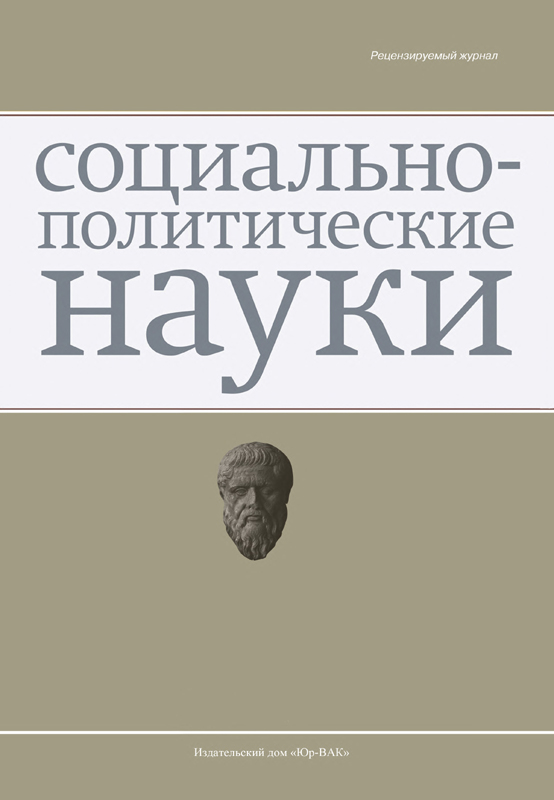Concerning the Role of the National Idea in the History of Civilizations
- Authors: Blinova M.A.1, Gusev V.E.2
-
Affiliations:
- Odintsovo branch of the MGIMO University
- Odintsovo branch of the International Law Institute
- Issue: Vol 13, No 3 (2023)
- Pages: 15-20
- Section: History and Theory of Politics
- URL: https://journals.eco-vector.com/2223-0092/article/view/562895
- DOI: https://doi.org/10.33693/2223-0092-2023-13-3-15-20
- EDN: https://elibrary.ru/DMZSZB
- ID: 562895
Cite item
Abstract
Purpose. The paper examines the role of the national idea in the history of the development of civilizations on the example of Russia and foreign countries.
Methodology. The authors relied on the following scientific principles: historicism, objectivity, complexity of studying the subject of research, also used scientific methods such as analysis, synthesis, induction, etc. and special methods of historical science, in particular, historical-genetic, historical-comparative methods, method of diachronic analysis during research.
Conclusions. The author concludes that the national idea forms as a guideline for the development of civilization, determining the direction of its political, spiritual and socio-economic development. There is a lot of factors are influencing formation of a national idea: religious, spiritual, moral, and geopolitical. Its content is partly determined by the specifics of the country’s socio-economic development. The formulation of its main provisions is influenced by political and philosophical scientific concepts. National ideas are largely based on the historical experience of the development of the nation, its ideas about its origin, ethnic and cultural roots, experience of interaction with neighboring states and nations. The emergence of a national idea may be due to historical circumstances. For example, the formation of the concept of “Moscow – the Third Rome” was associated with the tasks of forming a single Russian state, and the formulation of the contemporary national idea of the People’s Republic of China was the need to develop a special Chinese way of developing socialism. The advancement of a national idea that corresponds to the true tasks of the country’s development can serve as a powerful stimulus for its further development, and, conversely, neglecting many factors in determining its content can have disastrous consequences. Therefore, the research of the historical experience of putting forward a national idea, of course, requires deep study.
Practical significance. The conclusions have made in the article can be used in the development of the national idea of Russia, as well as in the teaching of history, political science and legal.
Full Text
About the authors
Margarita A. Blinova
Odintsovo branch of the MGIMO University
Author for correspondence.
Email: m.blinova@odin.mgimo.ru
ORCID iD: 0000-0002-0539-0875
SPIN-code: 2336-5527
ResearcherId: H-3212-2018
Candidate of History, associate professor at the Department of Public Law
Russian Federation, Odintsovo, Moscow regionVladimir E. Gusev
Odintsovo branch of the International Law Institute
Email: politistorik@yandex.ru
ORCID iD: 0000-0002-0657-4238
SPIN-code: 1444-5022
ResearcherId: AAP-5269-2021
Candidate of History, associate professor at the Department of State Theory and State Law Disciplines
Russian Federation, Odintsovo, Moscow regionReferences
- Dmitriev S.V., Kuzmin S.L. What is China? The Middle State in historical myth and real politics. Vostok. Afro-Asian societies: History and Modernity. 2012. No. 3. Pp. 5–19. (In Rus.)
- Klykina L.A. Institutionalization of the mythologema of Empire in Russian cultural consciousness (XV–XVI centuries). International Journal of Cultural Studies. 2014. No. 1 (14). Pp. 62–69. (In Rus.)
- Korochkina V.A. The national issue as one of the cornerstones of schisms in Israeli society? In: The outlines of transformations in politics, diplomacy and society of the state of Israel: Collection of articles based on materials of the I International Israel Studies Scientific Conference the Bovin Readings, Moscow, October 19–20, 2021. D.A. Maryasis et al. (eds.); E.E. Nosenko-Stein (scientific ed.). Moscow: IOS RAS, 2022. Pp. 325–352.
- Masyukova I.V. The law of return and the Israeli society: in search of compromise. In: The outlines of transformations in politics, diplomacy and society of the state of Israel: Collection of articles based on materials of the I International Israel Studies Scientific Conference the Bovin Readings, Moscow, October 19–20, 2021. D.A. Maryasis et al. (eds.); E.E. Nosenko-Stein (scientific ed.). Мoscow: IOS RAS, 2022. Pp. 353–370.
- Orekhov S.I., Reshetneva U.N. Philosophical and religious origins and content of China’s geopolitics, or the Chinese National Idea. Discourse-Pi. Ser.: Philosophy, Ethics, Religious Studies. 2004. Vol. 4. No. 1. Pp. 12–15. (In Rus.)
- Cui J. Sun Yat-sen’s concept of national and cultural identities. The Mission of the Confessions. 2021. Vol. 10. No. 2 (51). Pp. 203–209. (In Rus.)
- Finkelstein I., Silberman N.A. The Bible unearthed: Archaeology’s new vision of Ancient Israel and the origin of sacred texts. New York: Simon and Schuster, 2001. 400 с.
Supplementary files









